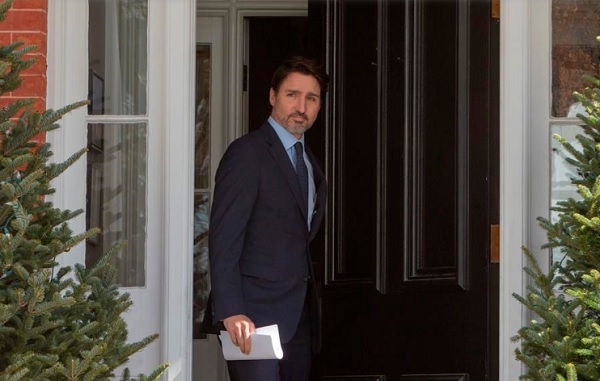OTTAWA – Border crossings between Canada and the U.S. are expected to grind to a near halt this week, and it could happen as soon as Friday night.
Prime Minister Justin Trudeau said Thursday morning he expects the border to shut down to non-essential traffic Friday overnight into Saturday, but told reporters both sides were still working out the details.
“We are continuing to work on the fine-tuning of the agreement between Canada and the United States,” Trudeau said from outside his home, where he remains under self-isolation. “I think it’s almost there, my understanding is that the measures will probably come into place in the night between Friday and Saturday. So, in about a day and a half.”
The Canada-U.S. border is the longest international border in the world between two countries. It’s estimated nearly 200,000 people usually cross it ever day.
While the announcement was officially made by the Prime Minister and the U.S. President on Wednesday in an effort to slow the spread of COVID-19, the border technically still remains open to tourists and recreational travellers.
Trudeau said how long schools, businesses and even the border will be effectively shut down is unclear, adding he’s listening to the advice of experts.
“We’ve heard anything from weeks to months. We know this is a difficult and extraordinary time in which Canadians are taking difficult and extraordinary measures, and we will continue to do that until Canadians are safe.”
On Wednesday, Deputy Prime Minister Chrystia Freeland said talks were still underway to determine the precise time of the closure. She also warned against anyone trying to cross at the last minute.
“Please don’t do it. It’s not good for you, it’s not good for your neighbours,” she said.
The border will remain open to trade and commerce for our supply chains and economy.
Truck drivers, Canadians and Americans who cross the border for essential work or other “urgent” reasons, as well as some others will be exempt from the closure.
On top of the U.S. border closure, the prime minister also highlight his government’s $82-billion financial aid package, which is aimed at helping businesses struggling and Canadians who are not working because of self-isolation or social distancing. Some employers have also shut down businesses amid the pandemic, which some parents have taken time off to look after their children.
Parliament has to be recalled next week to approve many of the measures and funding, which is expected to start flowing in early April.
There have been close to 700 cases of COVID-19 in Canada to date, including nine deaths — the majority of which have happened in B.C.
-With files from The Canadian Press
Source: 660


